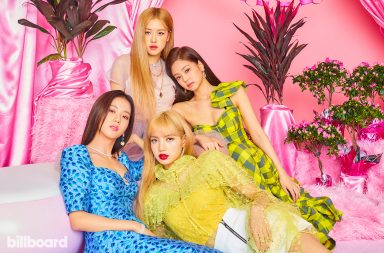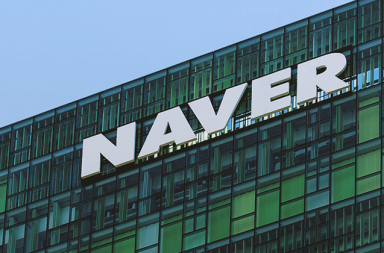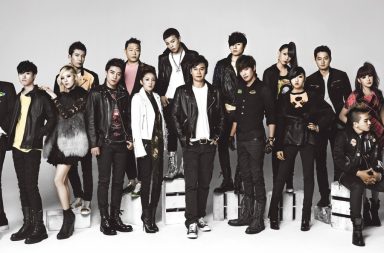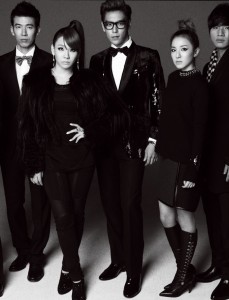 So just for this week, can we put aside our differences and agree that this is some pretty messed up shit? Because this is some pretty messed up shit.
So just for this week, can we put aside our differences and agree that this is some pretty messed up shit? Because this is some pretty messed up shit.
YG Entertainment posted an announcement yesterday on their official blog entitled “News About ‘New Boy Group’” — which, for a company infamous for handling debuts in a manner not dissimilar to that of a pizza delivery in the middle of Amish country, ought to spark some interest.
Briefly introduce us the new YG boy group.
There are two boy groups in preparation at YG Entertainment, and because we do not yet have official group names for them, I will go with Groups A and B.
Not quite as ominous as SM’s choice of M1 and M2 as codenames for predebut Exo, but I can still dig it.
Between A and B, who will be the first to debut?
As you can see from Big Bang who took 7 years to actually make a debut, it is impossible to debut two boy groups at in a similar timeframe.
This…doesn’t make any sense.
After much consideration, we are planning to reveal one of the groups this year. I will leave the rest to the audience completely to see how the plan goes.
For this, we have been shooting something called Real Survival Program every day and night. It will show the scene of a fierce battlefield between groups A and B.
The official name of this survival program is WIN, which stands for YG’s previous promotional phrase, “WHO IS NEXT”.
So it’s like Hot Blood. Or Mydol. Except with a more gladiator-y flair. Which of course, captures the essence of K-pop perfectly.
The structure goes like this: the group that wins the most votes from the watchers can make a debut as soon as the program finishes. The loser group may be broken up or face member replacement. Nothing will be predictable.
In other words, the winners receive fame, riches, and glory, while the losers…are sent to the shadow realm! Don’t tell me the Yu-Gi-Oh comparisons aren’t appropriate here, especially since this announcement basically suggests that the trainees who don’t win enough votes are condemned to a fate in which “nothing will be predictable” — meaning, you could end up debuting in a different group five years down the road, or you could just drop off the face of the planet forever. Like it says, nothing will be predictable!
Let’s face it: It’s a Maximillian Yangesus world, and we’re just living in it.
The winner of WIN will be given with an official name WINNER. This WIN Program will be aired one episode a week for 10 weeks from the second week of July. WINNER will be making a debut the day after the 10th episode finishes.
WINNER. The winning group will be called WINNER. And everyone knows that there can’t be a winner without a big, fat loser. Ah, YG. Always one for tact.
The program may sound harsh, but this is a competition no professional artists can avoid in this field. This will be a program that portrays the reality in the most transparent manner.
So at least they’re being honest by admitting that the premise of this show is “harsh,” but then they turn around and say, “Eh, what the hell — this is how reality works, and we’re just putting cameras in front of it.”
Let’s get one thing straight: If YG is expecting any pats on the back for their “transparency” in revealing the cutthroat nature of the idol selection process, they’re not getting any from me. Anyone who’s spent a decent amount of time in K-pop knows full well that the audition and training process for K-pop idols is grueling and merciless, and that little effort is made to ensure that the delicate, naive dreams and emotions of these 12-year old trainees remain unmarred by the unforgiving and ruthless demands of the business world.
 Everyone knows what happens behind the scenes, but almost nobody wants to see it. The hot messes of reality TV are one thing, but the game changes completely when you’re dealing with kids. A show like WIN might be beneficial if its premise was to expose the reality of the K-pop trainee experience and criticize its harmful toll on its young participants. But that’s not what WIN is doing. WIN is presenting this harsh, troubling reality as trivial entertainment.
Everyone knows what happens behind the scenes, but almost nobody wants to see it. The hot messes of reality TV are one thing, but the game changes completely when you’re dealing with kids. A show like WIN might be beneficial if its premise was to expose the reality of the K-pop trainee experience and criticize its harmful toll on its young participants. But that’s not what WIN is doing. WIN is presenting this harsh, troubling reality as trivial entertainment.
This alone is reason enough to question the integrity of WIN. Not only does the show commodify trainees into disposable little pawns worth nothing apart from their potential marketability as pop idols, but it encourages the viewers to engage directly in this commodification by employing viewer votes as a key factor of the show’s outcome. Argue all you want about the cutthroat reality of the entertainment industry and the idea that there’s no room for hurt feelings in showbiz, but there’s no getting around the fact that the dehumanization and commodification of people for the sake of profit is wrong and ought not to be tolerated, no matter the circumstances. Turning it into entertainment is even worse.
But what’s even more troubling is YG’s unapologetic attitude towards this whole mess. The last line quoted above is particularly chilling — YG fully acknowledges the “harshness” of the show’s premise, but shrugs it off by saying that the only thing they’re guilty of is their honest portrayal of the reality of the idol casting process. There’s nothing wrong with honesty, obviously, but YG doesn’t seem to think that the cruel reality unveiled through this honesty is problematic at all. In fact, they seem to be so comfortable with it that they’re willing to create a reality show around it.
YG’s treatment of their trainees and their choice to pit them against each other a la Battle Royale is unsettling in itself, but their nonchalant, “business-as-usual” attitude and their regard towards their trainees as disposable and commodifiable objects is what makes the existence of a show like WIN especially sickening. Instead of addressing the potentially damaging effects of the idol training process on its young participants and taking measures to remedy it — even small measures that would make minimal impact on its existing business model — YG chooses not to acknowledge any of this and simply accepts “reality” for what it is. Through their pacifism, YG claims that there is no other way to do business apart from treating their trainees like disposable commodities and sacrificing their dignity and mental well-being for the sake of profit and ruthless efficiency. Furthermore, YG’s willingness to produce and flaunt a show like WIN demonstrates that they are long past the point of caring whether or not their trainees are people or just things. For an entertainment company that prides itself on treating its artists well and being a “family,” YG is proudly unapologetic in their embrace of a showbiz “reality” that is unnecessarily and avoidably cruel.
 Virtually every K-pop entertainment company is guilty of commodifying their trainees and artists to some degree, and obviously there are other companies whose trainees suffer far more abuse than those of YG. But the fact that YG has the guts to produce a variety show that effectively glamorizes this commodification and abuse really puts them in a league of their own. YG is one of the most powerful and influential entities of the Korean entertainment world, and they make sure that everyone knows it. But for all their power and influence, there is absolutely no reason why YG should be able to make the claim that a “competition” that they themselves admit to being “harsh” is completely unavoidable. There is absolutely no reason why YG can boast about their dominance and influence over the industry and yet assert that they are at the complete mercy of the industry and claim that there’s nothing they can do about the cruel conditions and treatment that their own trainees must face. This isn’t a matter of accepting reality. This is YG refusing to consider anything except their own best interests and being arrogant enough to shut down all other options as impossibilities.
Virtually every K-pop entertainment company is guilty of commodifying their trainees and artists to some degree, and obviously there are other companies whose trainees suffer far more abuse than those of YG. But the fact that YG has the guts to produce a variety show that effectively glamorizes this commodification and abuse really puts them in a league of their own. YG is one of the most powerful and influential entities of the Korean entertainment world, and they make sure that everyone knows it. But for all their power and influence, there is absolutely no reason why YG should be able to make the claim that a “competition” that they themselves admit to being “harsh” is completely unavoidable. There is absolutely no reason why YG can boast about their dominance and influence over the industry and yet assert that they are at the complete mercy of the industry and claim that there’s nothing they can do about the cruel conditions and treatment that their own trainees must face. This isn’t a matter of accepting reality. This is YG refusing to consider anything except their own best interests and being arrogant enough to shut down all other options as impossibilities.
And I can’t believe I have to say this, but the fact that people are disgusted by YG’s decision to produce this show and are calling them out on it is not just cause for YG fans to start crying about yet another YG Family versus The Rest of The Universe fanwar. Not only is it incredibly petty to think that YG’s immoral choices should be defended from criticism, but it’s also incredibly short-sighted to think that these criticisms from non-YG fans are only bubbling up because they all have an axe to grind against YG. As an SM fan, I have an invested interest in YG’s decision because YG’s words and actions have a strong influence over everything in K-pop, including SM and its idols. By creating a show like WIN, YG publicly affirms and endorses the belief that the mistreatment and commodification of trainees is not only normal, but is necessary.
This lessens the pressure and lowers the standards for larger companies like SM and JYP to treat their trainees and artists with equity for the sake of good PR. This gives the green light for smaller, shadier companies to continue abusing trainees with a lighter conscience, since a respectable company like YG has already shown its true colors in regards to its treatment of trainees. This is the stuff of dreams for businessmen looking to enter the K-pop industry solely with the aim of making a profit. If this sounds extreme to you, remember that the real reason why WIN is problematic isn’t because that survivor-esque reality TV shows are wrong, but because YG’s decision to air this show shows that YG sees its trainees as commodities and not people, and that they are not sorry for it.
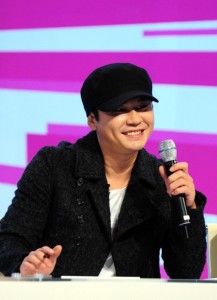 However, there is a way out. The one fault in YG’s design plan for WIN is that it is completely reliant on audience participation for the show to work. The momentum behind the competition in WIN is fueled by the audience and their emotional investments in wanting to see one of the trainee groups come to debut. YG created this show with the assumption that audiences would endorse and engage in commodifying these trainees in the same way that YG does, and that audience votes would be an indication of interest and projected consumership of whichever group wins the competition. If no one cares about the competition, there will essentially be no competition. Will this stop YG from treating their trainees like trading cards or chess pawns? Probably not; it probably won’t even stop YG from airing the program in the first place. But if a successful boycott of this show is good for anything, it’s this: it will indicate to YG that their idea of reality sits very badly with their target audience, and that viewers will not buy the debut of a new boy group with votes that further contribute to the commodification of the very trainees that they want to see debut.
However, there is a way out. The one fault in YG’s design plan for WIN is that it is completely reliant on audience participation for the show to work. The momentum behind the competition in WIN is fueled by the audience and their emotional investments in wanting to see one of the trainee groups come to debut. YG created this show with the assumption that audiences would endorse and engage in commodifying these trainees in the same way that YG does, and that audience votes would be an indication of interest and projected consumership of whichever group wins the competition. If no one cares about the competition, there will essentially be no competition. Will this stop YG from treating their trainees like trading cards or chess pawns? Probably not; it probably won’t even stop YG from airing the program in the first place. But if a successful boycott of this show is good for anything, it’s this: it will indicate to YG that their idea of reality sits very badly with their target audience, and that viewers will not buy the debut of a new boy group with votes that further contribute to the commodification of the very trainees that they want to see debut.
Of course, there’s also the possibility that YG could not give a flying frack about what their audience thinks about responsible and ethical business — after all, what does a lay audience know about business compared to the geniuses at YG? — but the point is this: YG has a lot of influence, and their choice to produce WIN is a very foolish and potentially dangerous use of that influence.
If you are concerned about young female trainees being sexually abused in exchange for an idol debut, you should be concerned about this show. If you are concerned about the fair treatment of K-pop idols by their management, you should be concerned about this show. If you are concerned about an entertainment industry that is showing increased acceptance of the “reality” of pop artist-hopefuls surrendering pieces of their humanity in order to survive training, you should definitely be concerned about this show. It is crucial to not underestimate the magnitude of YG’s influence over industry attitudes on equity and ethics. A show like WIN is not going to be some late night cable television program featuring a nugu idol. It has YG’s stamp of approval all over it, and it will matter — to smaller companies wanting to emulate YG’s brand of success, to other executives looking for loopholes, to people who look up to YG and believe that YG genuinely has the best interests of their artists in mind. With all its influence and power, YG is in an excellent position to set high standards of ethics and equity for the entire K-pop industry. But their choice to produce WIN instead shows their utter lack of regard for ethics and equity.
(yg-life; images via YG Entertainment, SM Entertainment, SBS)
